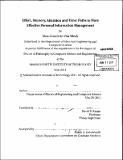Effort, memory, attention and time : paths to more effective personal information management
Author(s)
Van Kleek, Max, 1980-
DownloadFull printable version (26.02Mb)
Alternative title
Paths to more effective personal information management
Other Contributors
Massachusetts Institute of Technology. Dept. of Electrical Engineering and Computer Science.
Advisor
David R. Karger.
Terms of use
Metadata
Show full item recordAbstract
With the widespread availability of digital tools for storing, accessing, and sharing information, why is so much information still lost, forgotten, or kept on paper? The work in this thesis finds that such disorganization results from problems in the designs of the personal information management (PIM) tools in common use today. Such problems impede information capture, force many information forms to be left out, and cause information to be forgotten. How can these problems be mitigated? Our Information Scraps study identifies the need to support more diverse kinds of information, while conserving time, attention, and memory for retained information items. Our first approach to achieving these goals is to eliminate the artificial separation and homogeneity that structured PIM tools impose, so that arbitrary information can be captured in any way desired. A two-year study of List-it, our short-note-taking tool, discovers that people keep notes serving 5 primary roles: reminders, reference items, progress trackers, places to think, and archives of personal value. The second reintroduces structured data to support more effective use and management of information collections. Jourknow addresses the manageability of large note collections with lightweight-structured note contents and contextual retrieval, the access of notes by the contexts and activities at the time of creation. Poyozo reinforces recollection of previously seen information, by providing visualizations of all of a person's past information activities. Finally, Atomate addresses the challenge of managing the ever-increasing deluge of new information, by letting people delegate to software behaviors actions to be automatically taken when new information arrives. These studies identify critical needs of PIM tools and offer viable solutions.
Description
Thesis (Ph. D.)--Massachusetts Institute of Technology, Dept. of Electrical Engineering and Computer Science, 2011. Cataloged from PDF version of thesis. Includes bibliographical references (p. 256-272).
Date issued
2011Department
Massachusetts Institute of Technology. Department of Electrical Engineering and Computer SciencePublisher
Massachusetts Institute of Technology
Keywords
Electrical Engineering and Computer Science.